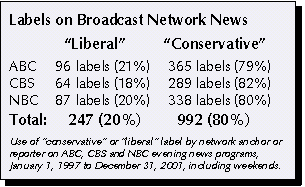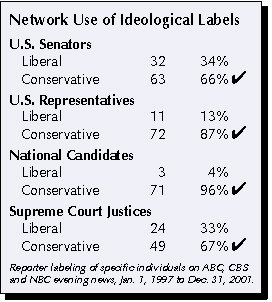 |
|||||||||
|
 |
||
|
 |
||||||||||||||||||||||||
|
||||||||||||||||||||||||
 |
||||||
|
||||||
 |
||||||
|
 |
||||||||||||||||||
|
||||||||||||||||||
 |
||||||||||||||||||||||||
|
||||||||||||||||||||||||
 |
||||||||||||||||||
|
||||||||||||||||||
|
|
|
For Immediate Release: Katie Wright (703) 683-5004 - Tuesday, June
25, 2002

MRC Study: On Evening News Broadcasts, Conservative
Burying the Liberal Former CBS News correspondent Bernard Goldberg infuriated liberal journalists when he leveraged his 28 years of experience at a national news network into a damning indictment of his colleagues' liberal groupthink. Bias: A CBS Insider Exposes How the Media Distort the News topped the New York Times bestseller list for weeks, prompting some unhappy scribes to launch vicious ad hominem attacks on the whistle-blower. "Disgruntled has-beens everywhere have a new hero and role model," the Washington Post's Tom Shales whined in the January 7 Electronic Media. Citing no evidence, Shales dismissed liberal media bias as "an old canard" and blasted Goldberg's book as part of a "laughably inept hate campaign" written by "a no-talent hack." The only attempt to factually challenge Goldberg's evidence has come from linguist Geoffrey Nunberg. "He [Goldberg] claims that the media pointedly identify conservative politicians as conservatives but rarely use the word 'liberal' to describe liberals. As Goldberg describes the difference, 'In the world of the Jennings and Brokaws and Rathers, conservatives are out of the mainstream and have to be identified. Liberals, on the other hand, are the mainstream and don't have to be identified,'" Nunberg correctly summarized on NPR's Fresh Air on March 19. Then Nunberg claimed he'd proven otherwise - he plugged the names of prominent liberals and conservatives into a newspaper database and found "the average liberal legislator has a 30 percent greater likelihood of being identified with a partisan label than the average conservative does." The liberal media embraced his results. But the claim that liberals are subjected to greater labeling doesn't square with numerous studies the Media Research Center conducted in the 1980s and 1990s. These studies demonstrated that news stories identify right-leaning think tanks and groups as "conservative" much more often than left-leaning groups are called "liberal." One example: the group Concerned Women for America is called conservative in 41 percent of stories while the National Organization for Women was tagged as liberal only two percent of the time. (For details, see previous studies.) Given the controversy, we checked to see if Goldberg's observations about network news would be verified by a systematic analysis. MRC researchers used the Nexis database to discover each use of the word "liberal" and "conservative" on ABC's
World News Tonight, the CBS Evening News and NBC Nightly News for five years, from January 1, 1997 through December 31, 2001. Each reference was examined to weed out duplicate cases or instances when the word was used in another context (such as "conservative crowd estimates" or "liberal arts colleges"). In addition, labels were eliminated if they were attributed to a news source rather than the network reporter.
(See the complete description of the methodology.) Eventually, the 2,020 records found by the Nexis search engine were pared down to 924 records containing 1,239 bona fide reporter labels. The breakdown shows Goldberg was exactly right: reporters at ABC, CBS and NBC reached for the "conservative" tag four times more often than the "liberal" label to define politicians, interest groups and policy positions. (See box.) As Goldberg explained in Bias, "to Dan Rather and to a lot of other powerful members of the chattering class, that which is right of center is conservative. That which is left of center is middle of the road. No wonder they can't recognize their own bias." MRC's new study confirms Goldberg's worst suspicions: on ABC, conservatives received 79 percent of these labels; on NBC, 80 percent. On the CBS Evening News with Dan Rather, 82 percent of the 353 ideological labels assigned by CBS's reporters were given to conservatives, in contrast to a mere 18 percent for liberals. Conservative tags outnumbered liberal ones by wide margins during each of the five years, including both Democratic and Republican administrations and election and non-election years. Most of these labels were used to describe general groups, not individuals. That's what CBS's Phil Jones was doing, for example, when he argued on the January 16, 2001
Evening News that "hard-core conservatives have created a new verb, 'Borked,' after 1987 Supreme Court nominee Robert Bork." Yet hundreds of ideological modifiers were used by reporters to identify individual Representatives, Senators, Presidential and Vice Presidential candidates and Supreme Court Justices - and only a small fraction of these were assigned to liberals: • U.S. Senators: Jesse Helms was labeled more than any other Senator (16 times). CBS's Jones branded Helms an "ultra-conservative" on January 27, 1998, while on July 18, 1997, NBC's Andrea Mitchell called the Senator a "crusty, courtly conservative." Ted Kennedy was labeled a "liberal" eleven times, personally accounting for more than one-third of the total number of such labels of U.S. Senators (32). The third most-tagged Senator was also a presidential candidate: Republican John McCain of Arizona was called a "conservative" eight times. On February 19, 2000, for example, ABC's Linda Douglass insisted he had "a 17-year very conservative voting record" - even as McCain campaigned as the anti-conservative for the GOP presidential nomination. • U.S. Representatives: Only eight House Members, all Democrats, were identified as liberals, compared with 34 who were called conservatives. The media's conservatives included Democrats Gary Condit, Allen Boyd and Bart Stupak, all of whom have 70 percent or higher approval ratings of their lifetime voting record by the liberal Americans for Democratic Action (ADA). GOP whip Tom DeLay was the most frequently tagged (11 times). He was a "conservative hard-baller" to CBS's Eric Engberg (January 5, 1999) while Phil Jones marveled that DeLay is "a political and religious conservative, and proud of it" (December 10, 1998). On the other hand, then-CBS weekend anchor Paula Zahn called J.C. Watts "a conservative star...a family man and conservative icon" during an October 31, 1998 Evening News profile. • Presidential and Vice Presidential Candidates: Only one reporter, NBC's Lisa Myers, used "liberal" to describe Democratic candidate Bill Bradley (Sept. 25, 1999), and no network reporter labeled Vice President Al Gore as liberal during the entire 1999-2000 election cycle. In contrast, then-Governor George W. Bush was called a conservative 19 times. On August 14, 1999, for example, NBC's David Bloom defined Bush as "a tax-cutting, anti-abortion, pro-business, pro-school vouchers conservative." Reporters included Bush's "compassionate" modifier on six of those 19 labels, but CBS's Bill Whitaker tried to discredit that concept on August 3, 2000: "The compassion often obscures the conservative, but it's there." GOP Vice Presidential nominee Dick Cheney's conservatism was portrayed as scandalous during the week before the 2000 GOP convention. Dan Rather referred to Cheney's "hard-line conservative congressional voting record" (July 26, 2000) while NBC's Andrea Mitchell castigated Cheney's votes as "mainstream, perhaps, for a conservative Republican in 1980, but not for this day and age" (July 30, 2000). Cheney's Democratic counterpart Joe Lieberman was called a centrist or moderate eight times but never liberal, despite having been awarded a 95 percent approval rating from the liberal ADA in 1999. • Supreme Court Justices: Conservative Justices Antonin Scalia, Clarence Thomas and William Rehnquist were each labeled 13 times, while John Paul Stevens was labeled as liberal seven times. There were few flourishes in these labels, although CBS's Jones insisted on calling Chief Justice Rehnquist "a conservative Republican at heart" as the latter was set to preside at Clinton's impeachment trial (January 14, 1999). Very few of these 1,239 labels were wrongly applied, and terms such as "liberal" and "conservative" are a fine shorthand way to tell viewers where a politician, group or policy falls in the American political landscape. But the lopsided way that network reporters applied these labels to conservatives and not liberals over the past five years confirms Goldberg's observation that network reporters generally regard conservatives as having alien and eccentric views that need to be labeled, while liberal beliefs require no special identification. -- Rich Noyes
• Also, read the methodology of the study • And, see previous MRC labeling studies
Home | News Division
| Bozell Columns | CyberAlerts |









